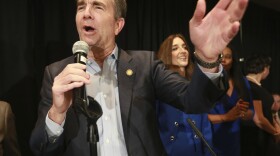
Mary Louise Kelly
Mary Louise Kelly is a co-host of All Things Considered, NPR's award-winning afternoon newsmagazine.
Previously, she spent a decade as national security correspondent for NPR News, and she's kept that focus in her role as anchor. That's meant taking All Things Considered to Russia, North Korea, and beyond (including live coverage from Helsinki, for the infamous Trump-Putin summit). Her past reporting has tracked the CIA and other spy agencies, terrorism, wars, and rising nuclear powers. Kelly's assignments have found her deep in interviews at the Khyber Pass, at mosques in Hamburg, and in grimy Belfast bars.
Kelly first launched NPR's intelligence beat in 2004. After one particularly tough trip to Baghdad — so tough she wrote an essay about it for Newsweek — she decided to try trading the spy beat for spy fiction. Her debut espionage novel, Anonymous Sources, was published by Simon and Schuster in 2013. It's a tale of journalists, spies, and Pakistan's nuclear security. Her second novel, The Bullet, followed in 2015.
Kelly's writing has appeared in the Wall Street Journal, The New York Times, The Washington Post, Politico, Washingtonian, The Atlantic, and other publications. She has lectured at Harvard and Stanford, and taught a course on national security and journalism at Georgetown University. In addition to her NPR work, Kelly serves as a contributing editor at The Atlantic, moderating newsmaker interviews at forums from Aspen to Abu Dhabi.
A Georgia native, Kelly's first job was pounding the streets as a political reporter at the Atlanta Journal-Constitution. In 1996, she made the leap to broadcasting, joining the team that launched BBC/Public Radio International's The World. The following year, Kelly moved to London to work as a producer for CNN and as a senior producer, host, and reporter for the BBC World Service.
Kelly graduated from Harvard University in 1993 with degrees in government, French language, and literature. Two years later, she completed a master's degree in European studies at Cambridge University in England.
-
It's the longest that the director of national intelligence role has been unfilled since its creation 15 years ago. And the delay has implications for the U.S. intelligence community and beyond.
-
Rep. Doug Collins, the top Republican on the House Judiciary Committee, sat down with NPR after House Speaker Nancy Pelosi announced Democrats would move forward with articles of impeachment.
-
In an interview with NPR about her new book, former U.N. Ambassador Nikki Haley said she made an effort to avoid "toxic" and "trashy" Washington — and that she'll campaign for Trump in 2020.
-
Democrats will soon control Virginia for the first time since 1993. Gov. Ralph Northam tells NPR: "With a Democratic Senate and House, I believe we can move forward with common sense gun legislation."
-
The actor stars in — and directs, and wrote the screenplay for — his adaptation of Jonathan Lethem's detective novel. But he moved it to the 1950s to mine a dark side of NYC history.
-
 How The Relationship Between Trump And His Spy Chiefs SouredThe CIA whistleblower complaint that sparked the impeachment inquiry is just the latest in a history of bad blood. And the mistrust Trump has for U.S. intelligence could pose a national security risk.
How The Relationship Between Trump And His Spy Chiefs SouredThe CIA whistleblower complaint that sparked the impeachment inquiry is just the latest in a history of bad blood. And the mistrust Trump has for U.S. intelligence could pose a national security risk. -
The sole woman, Barbara Rentler of Ross Stores, clocked in at No. 75. Dozens of female CEOs have signed a letter demanding Forbes do better. Anne Wojcicki of DNA testing company 23andMe is among them.
-
Jemele Hill, a writer at The Atlantic, argues yes. She says doing so could benefit the colleges and the communities around them.
-
The new book, She Said, by two New York Times reporters, reveals the lengths to which Harvey Weinstein went to silence women who claimed sexual harassment, and how his allies looked the other way.
-
NPR's Mary Louise Kelly talks with Sheryl Crow about her latest album, Threads, and why this will probably be her last.







